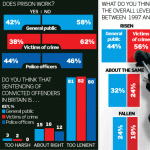Government outlines plans for fast-track justice – The Guardian
“Flash incarceration” of offenders who breach court orders, widespread naming online of those convicted, more witnesses giving evidence via videolink and Sunday court sittings are among measures outlined in government plans to speed up justice.
A white paper published by the policing and criminal justice minister, Nick Herbert, proposes major changes to the way magistrates, neighbourhood justice panels and police officers deal with less serious offences.
Many of the reforms are already under way in pilot projects across the country but other measures, such as allowing single magistrates to dispose of uncontested cases, will require legislation.
Herbert said: “Already some police forces are publishing the identity of convicted criminals on their websites. So the next step will be the widespread naming of offenders online so that communities have confidence that justice has been done. There are privacy issues to address, including protecting victims.”
On imposing short custodial punishments of a few days in prison, the minister said: “We can learn the lessons from initiatives such as the Hope project being run in Hawaii. It tackles those who fail to comply with court requirements by focusing on swift, predictable, and immediate sanctions – including the use of flash incarceration – for drug use or missed appointments.”
Many of the planned reforms are inspired by the response to last year’s riots. “During last year’s riots, we saw cases that normally take weeks and months being dealt with in just hours and days. We want this to become the norm, not the exception,” Herbert said.
“That is why we want a more flexible criminal justice system, including extending opening hours for courts, maximising the use of technology through virtual courts and prison to court videolinks and looking at radical proposals to speed up cases where offenders plead guilty.”
The current legal system was slow and “opaque, with lengthy, complex procedures which make little sense to the public”, Herbert said. “At over £20bn a year, it is one of the most expensive criminal justice systems in the world.
“And why do fewer than half of cases not go ahead on the scheduled date? Imagine if airlines were run like that.”
He said the criminal justice system had retained an “archaic love of paper”. Videolinks to local police stations will be installed in every crown and magistrates court centre by the end of the year. More witnesses, as well as defendants, should be able to use them to give evidence, it is hoped.
Previous suggestions that magistrates should hear cases in police stations do not feature in the white paper. They have been dropped in the face of objections by the Magistrates Association that their independence would be undermined.
Magistrates are to be encouraged to volunteer for the new neighbourhood justice panels. What type of low-level complaints will be dealt with by police caution in future and which will go before such justice panels has not yet been fully established.
The white paper calls for fewer time-consuming crown court trials. Defendants should retain the right to opt for jury trial but magistrates could lose the power to refer theft and handling cases that fall below a certain monetary threshold – perhaps £5,000 – to a crown court.
Those in the criminal justice system gave the proposals a qualified welcome. Max Hill QC, chairman of the Criminal Bar association, said improving efficiency was important, but added: “We are particularly concerned about the increased presumption that cases will be run in the magistrates courts based purely on the financial value of the case. This is a blunt instrument which may not properly reflect the severity of the offence, and demonstrates the government’s commitment to cheap justice.
“Late and weekend court sittings enabled the criminal justice system to manage its vastly increased workload following the summer riots, but longer hours are not the answer to inefficiency. They place a strain on the courts and on court workers, and may lead to delays and poor outcomes.”
Richard Atkinson, chair of the Law Society’s criminal law committee, said: “There is potential for there to be efficiency improvements arising from the increased use of prison-to-court videolinks. However, we are concerned by the government’s obsession with speed and its apparent belief that speed and efficiency are one and the same thing.
“We question whether there is any need for weekend courts at a time when the numbers of criminal cases are declining and when these proposals will cause problems for prisons and the availability of other professionals in the system.”
John Fassenfelt, chairman of the Magistrates Association, said many of the delays in the system were due to the length of police investigations. “We don’t want to see local justice brought back through neighbourhood panels,” he said.
Roma Hooper, director of Make Justice Work, said: “We broadly support the principles … However, our chief concern is that speeding up the courts service must not lead to offenders receiving inadequate or inaccurate assessments. Get this wrong and offenders on community sentences will not access the services and support needed, such as drug, alcohol and mental health services, to tackle their criminal behaviour.”
The Ministry of Justice also announced the fees it is introducing for employment tribunals. Cases that progress all the way to full hearing will cost £1,200, and opting instead for mediation by a judge will cost £600.
Unison’s general secretary, Dave Prentis, said: “This is a disgraceful move that tips the scales of justice heavily towards employers and denies legal redress to those who do not have the cash to pay for it. Workers in the UK are already subject to the toughest employment laws in Europe, and this move represents another blow against workers’ employment rights at a time when they have never been more needed or valuable.”
Read the full article on the Guardian website.







